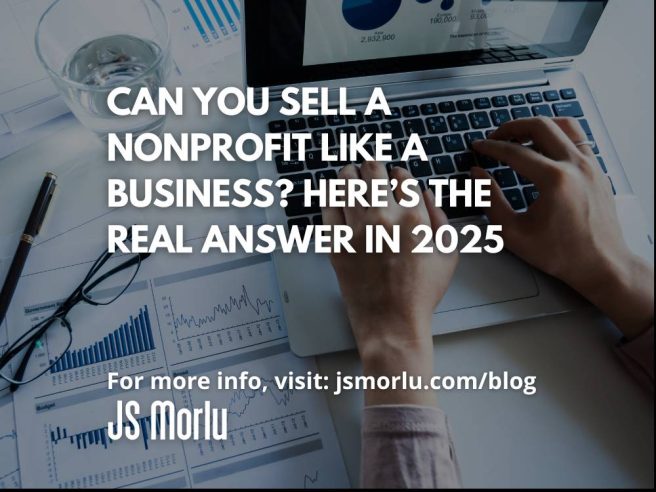By: John S. Morlu II, CPA
Imagine you started a nonprofit that helps kids learn how to read. It gets popular. Donors love it. A big organization offers you money to take it over. You might wonder:
Can I sell my nonprofit the same way someone sells a business or a house?
The short answer is no—but the real answer is more interesting than that.
Let’s break it down in a way that makes sense, using stories, facts, and examples.

What Is a Nonprofit?
A nonprofit is an organization that helps people or supports a mission. It does not exist to make a profit. Most are approved by the government as 501(c)(3) organizations, which means they don’t pay income tax, and people who donate can get a tax break.
But here’s the thing:
Nonprofits don’t have owners.
That means you can’t sell one like you would a coffee shop or lawn care business.
Why You Can’t “Sell” a Nonprofit
When you start a for-profit business, you own it. You can sell it, keep the money, and walk away. But nonprofits are different.
They belong to the public, not to you.
So:
- You can’t take the money and run
- You can’t sell the name or programs for profit
- If the nonprofit closes, all assets (like cash, buildings, supplies) must go to another nonprofit, not to you or your team
Fact: This rule comes from the IRS, which oversees how nonprofits operate. If you try to sell one the wrong way, you could get in legal trouble.
What You Can Do Instead
Even though you can’t sell a nonprofit, there are smart ways to exit, transition, or share what you’ve built.
1. Merge with Another Nonprofit
You can combine your organization with a bigger group that shares your mission. This helps keep your work alive and can give you a role in the new team.
Example: A small nonprofit helping homeless youth merges with a national shelter group. The programs continue, staff keeps their jobs, and the founder becomes a paid advisor.
2. Hand It Off to a New Leader
If you’re tired or ready for something new, you can bring in a new executive director or board chair to run things.
This is called a leadership transition, and it’s very common.
Tip: Make sure the new leader understands your mission and has a plan to keep it going strong.
3. License or Share Your Programs
If you created special programs, like workbooks or online courses, you might be able to license them to other nonprofits or schools.
That means others pay to use your material—but they don’t own your nonprofit.
Example: A nonprofit with a reading program for middle schoolers lets 10 school districts use its lessons for a small fee. The program reaches more kids, and the nonprofit earns income to keep running.
4. Become a Consultant or Speaker
After running a successful nonprofit, some founders write books, give speeches, or start a consulting business. They don’t sell the nonprofit—but they use their experience to create a new business.
Can You Sell a Nonprofit’s Website or Name?
Sort of. It depends.
You might personally own the:
- Website domain (like HelpingKids.org)
- Logos or designs
- Social media accounts
- Training guides or apps
If these things were created before the nonprofit or with your own money, they might belong to you. But if you built them while running the nonprofit, they usually belong to the organization.
Be careful: Selling these assets without permission could lead to a lawsuit.
Surprising Nonprofit Stats
- There are over 1.5 million nonprofits in the U.S.
- Around 45,000 new ones are created every year
- Half of all new nonprofits stop filing tax returns after the first year
- That means many founders burn out or give up—often without knowing how to hand over what they built
Be Careful of “Quick Sale” Scams
Some websites or people might say:
“Buy a ready-made 501(c)(3) and get fast funding!”
⚠️ Don’t do it.
You can’t legally buy or sell tax-exempt status like it’s a toy or a car. It’s a public license, and trying to flip it can get you audited or even fined.
So, Can You Flip a Nonprofit?
No, not for personal profit. But you can:
- Pass it on to someone else
- Join forces with another group
- License your ideas or programs
- Use your nonprofit success to build a consulting or coaching business
If done right, you don’t walk away with a bag of money—but you walk away with influence, respect, and options.
Final Thought: The Profit in a Nonprofit Is the Purpose
Starting a nonprofit is not about “getting rich.” It’s about building something that helps people. But if you’ve created something special, there are smart ways to pass it on, keep it going, and open doors for your next chapter.
You can’t sell the soul of a mission—but you can build something that lives beyond you.
📖 Read next: Nonprofits Under Pressure: What’s Happening and Why It Matters in 2025
Author: John S. Morlu II, CPA is the CEO & Chief Strategist of JS Morlu, a globally acclaimed public accounting and management consulting powerhouse.
Through cutting-edge technology and data-driven strategy, JS Morlu helps organizations operate with clarity, control, and compliance.
– ReckSoft (www.recksoft.com ): AI-powered reconciliation for nonprofit and donor accounting
– FinovatePro (www.finovatepro.com ): Cloud accounting for donor-driven missions
– Fixaars (www.fixaars.com ): Empowering nonprofits with maintenance and repair logistics
JS Morlu LLC is a top-tier accounting firm based in Woodbridge, Virginia, with a team of highly experienced and qualified CPAs and business advisors. We are dedicated to providing comprehensive accounting, tax, and business advisory services to clients throughout the Washington, D.C. Metro Area and the surrounding regions. With over a decade of experience, we have cultivated a deep understanding of our clients’ needs and aspirations. We recognize that our clients seek more than just value-added accounting services; they seek a trusted partner who can guide them towards achieving their business goals and personal financial well-being.
Talk to us || What our clients says about us



